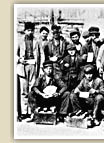
Child and infant mortality rates reached high levels, and there was an increase
of child abandonment, as official statistics show.
Another 'invisible' aspect of Greek society, registered for the first time
in the protectionist legislation of the period, was child labour. Children, boys and girls,
were occupied in agricultural, building, manufacturing and occasional jobs, working as servants or in shipping.
A remarkable percentage besides (as can be seen from the census returns) was occupied in industry. In this
field they began working from a very early age with low wages
and exhausting timetables.
Concern for childhood and its special needs became more conspicuous amid the more prosperous
strata of Greek society. Such attitudes were reflected in artistic creation that included children in its themes
or that addressed them directly through children's literature.
|
 |
